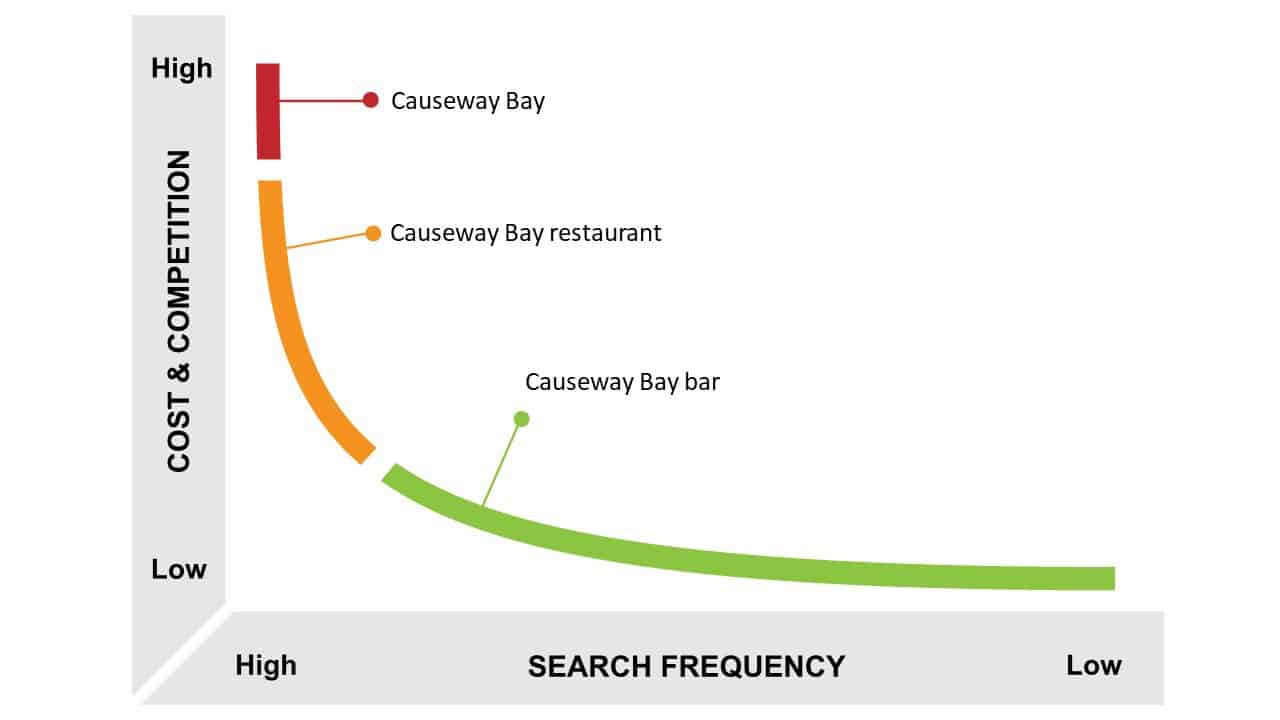If you’ve ever delved into SEO, then you’ve probably heard of long-tail keywords. Still, the concept can be unclear: What makes a keyword long-tail? And what is the benefit to optimizing for long-tail keywords?
Don’t worry! In this article, we give a clear explanation of long-tail keywords (with examples!) and discuss the advantages of ranking for long-tail keywords.
What are long-tail keywords?
Long-tail keywords are search terms that are less popular but more specific. On one hand, they are keywords that have a lower search volume (search volume refers to how many times a term has been searched in a given period) because of their specificity. On the other hand, as highly focused search queries, long-tail keywords tend to have higher conversions.
But how can we define whether a keyword is less popular? Let us explain with an example.
Let’s say you are traveling to Hong Kong and wanting to visit Causeway Bay. You search “Causeway Bay” in Google to find out more about this neighborhood:
Here, we can see that “Causeway Bay” has high search volume. We usually call keywords like this generic. Generic keywords have a more general and relatively wider scope of meaning—and higher search volume as a result.
Let’s get back to the example. So, now you have a cursory understanding of Causeway Bay after your search. You decide to grab something to eat in Causeway Bay; thus, you search in Google again, but this time with “Causeway Bay restaurant.”
As you can see, the search volume is lower for “Causeway Bay restaurant.” This is how we discover a long-tail keyword: With a more specific topic, the query becomes less popular but more focused.
And it can go deeper and deeper. You feel like it’s time for happy hour, so you search “Causeway Bay bar” in Google for a good place to drink.
This is another long-tail keyword for the generic topic of Causeway Bay. Again, as the query becomes more focused, it has lower search volume.
A keyword that has less search volume tends to be less competitive (we will talk more about this later). We can see such correlation with the 3 keyword examples:
See the “tail” at the bottom of the graph? That is the reason we call these queries long-tail keywords. Long-tail keywords literally have a longer tail-end when looking at cost/competition vs search frequency on a graph.
What are the benefits of long-tail keywords?
Incorporating long-tail keywords into your content strategy has two key benefits: less competition and more conversions.
Long-Tail Keyword Benefit #1: Less competition
Now, we all understand what a long-tail keyword is. But why is it beneficial to include such keywords in your content strategy? Isn’t it better to rank for a keyword with higher search volume, since it will attract more traffic?
That is technically correct in theory. However, in practice, you face tougher competition when aiming to rank for a higher search volume keyword. Let’s take a look at the number of search results for the keyword “Causeway Bay.”
Quite a lot of results, right? You can imagine how hard it will be to rank for this generic keyword. Now, let’s see how many search results appear for the keyword “Causeway Bay bar” instead:
The number of results is much lower than the results that appear for “Causeway Bay.” In this case, if you want to create content on Causeway Bay that has a better chance of ranking well, you should go for “Causeway Bay bar,” which is a long-tail keyword that has less competition.
Long-Tail Keyword Benefit #2: More conversions
Mitigating competition is not the only benefit of long-tail keywords. Because they are more specific phrases, long-tail keywords also tend to have higher conversation rates.
Let’s examine the “Causeway Bay” and “Causeway Bay bar” examples again. What are people looking for when they search “Causeway Bay?” It can basically be anything. When someone searches for a generic keyword, they are usually just wanting to know more about what it is.
But this is different for the long-tail keyword “Causeway Bay bar.” When people add the more specific word “bar” in their search query, they have a firm intention to find a place to drink. If you are a bar owner, it is more worthwhile to rank for “Causeway Bay bar” than simply “Causeway Bay.”
When someone searches for a long-tail keyword, they are probably more likely to make a purchase as they are searching for more specific results.
***
Long-tail keywords are highly specific search terms that allow users to zero in on your result. Using long-tail keywords in your content strategy creates less competition and generates more conversions, ultimately driving more sales.













